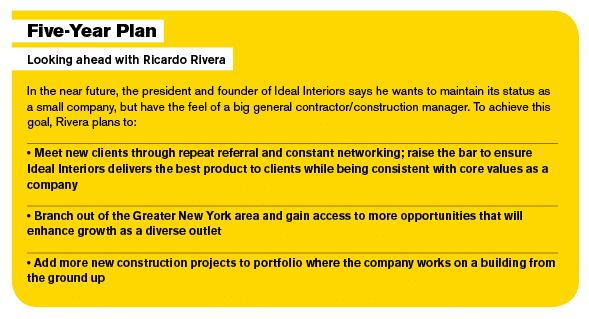
“When you’re first starting out you will constantly ask yourself one question: Will we survive the first year? I didn’t know how to market our company and finding work was the biggest challenge because in this industry, it’s completely dependent on previous clients and the reputation you’ve built. And when you’re first starting out, you don’t have either of those things. There was so much I didn’t know, but thankfully I had mentors I could turn to and these are people I still trust and turn to when I have major business decisions to make. I can’t stress how vital mentors are because they’re truthful with you; they don’t sugarcoat things.
If you want to be a successful entrepreneur you need to realize that you’re in charge of your own destiny and you have to remember that whatever you do affects your company. If I slow down, the whole company slows down. Entrepreneurs have a special gene, they don’t take things day-by-day. They’re always looking forward trying to map out what’s next. There’s also this misconception that entrepreneurs don’t have bosses, but our clients are our boss. Every project has to be your best project. Your client’s happiness is your business.
I wasn’t always this driven. I started the company thinking, “Let’s try this and see if it works.” In the past, I’ve worked for small and large companies. With larger companies you never see the back vault, but if you work for a smaller operation you should consider yourself lucky because you learn more; you learn the inner workings of a company and you get a better feel for the industry. It was working at a smaller company that made me believe I could do this. I like that Ideal Interiors is on the smaller side. It means that I have access to my clients and they have direct access to me and for the time being, I wouldn’t have it any other way. I just think of it this way: If I don’t have clients, I don’t have a job. You have to answer every call, give every job 100 percent, and always put your best foot forward.

The construction industry is a great place for Latinos. It used to be considered “blue collar,” but it’s now seen as very respectable. The fact that so many of us are bilingual is an incredible resource. When you get to work with other Latinos in this industry, there’s an unspoken connection the two of you have. I’m from Ecuador and working with others who share my heritage gives me a good feeling because I know we’re watching out for each other; we want to see each other succeed.
The best advice I can offer to a young Latino who wants to enter this industry—or any industry—is to pay attention to everything that’s going on. Listen to those who’ve been in the industry longer than you. I’ve come across a lot of young people who think they know everything and feel they’re entitled to certain things because they’ve obtained a college degree. It’s a huge accomplishment to get your degree, but there are no entitlements and you can’t take anything for granted. Your “real” education begins when you’re in the workforce and working hard for everything you want. You’ve got to do your time like everyone else.”

